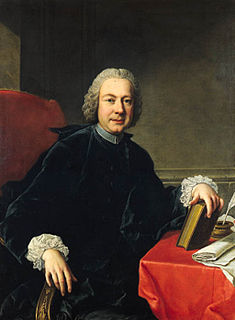A Quote by Pietro Metastasio
If every man's internal care Were written on his brow, How many would our pity share Who raise our envy now?
Related Quotes
To Mercy Pity Peace and Love All pray in their distress, And to these virtues of delight Return their thankfulness. For Mercy Pity Peace and Love Is God our father dear. And Mercy Pity Peace and Love Is Man his child and care. Then every man of every clime That prays in his distress Prays to the human form divine: Love Mercy Pity Peace. And all must love the human form In heathen, Turk, or Jew. Where Mercy, Love and Pity dwell There God is dwelling too.
Away with tears and fears and troubles! United in wedlock with the eternal Godhead Itself, our nature ascends into the Heaven of Heavens. So it would be impious to call ourselves 'miserable.' On the contrary, Man is a creature whom the Angels-were they capable of envy-would envy. Let us lift up our hearts!
Many concerns now make part or the whole of their dividends from by-products that formerly went to waste. How do we, as individuals, utilize our principal by-product? Our principal by-product is, of course, our leisure time. Many years of observation forces the conclusion that a man's success or failure in life is determined as much by how he acts during his leisure as by how he acts during his work hours. Tell me how a young man spends his evenings and I will tell you how he is likely to spend the latter part of his life.
If Jesus Christ were to sit down with us and ask for an accounting of our stewardship, I am not sure He would focus much on programs and statistics. What the Savior would want to know is the condition of our heart. He would want to know how we love and minister to those in our care, how we show our love to our spouse and family, and how we lighten their daily load. And the Savior would want to know how you and I grow closer to Him and to our Heavenly Father.
I now began for the first time to envy those young cubs at the university who had fine scholars to tell them what was what; professors who had devoted their lives to mastering and focusing ideas in every branch of learning; who were eager to distribute the treasures they had gathered before they were overtaken by the night. But now I pity undergraduates, when I see what frivolous lives many of them lead in the midst of precious fleeting opportunity. After all, a man's Life must be nailed to a cross either of Thought or Action. Without work there is no play.
I'm no use to anybody,' I say. 'I'm a cérébrale, can't you see that?' Thinking how funny a book would be, called 'Just a Cérébrale or You Can't Stop Me From Dreaming'. Only, of course, to be accepted as authentic, to carry any conviction, it would have to be written by a man. What a pity, what a pity!
From the time we begin school, if not sooner, we are taught to be blind to our assets and only see our deficits. We are carefully marked on how many we got wrong on a test and, rarely if ever, asked how we know how to spell the ones we got right. By the time we are adults, we are well versed in every one of our limitations, skilled in our incompetence. If we were fish in an aquarium, it would be as if we kept smashing against the glass, and forgot the fact that we were perfectly capable of turning ever so slightly and swimming gracefully in the water all around us.
Didn't we all have dreams when we were young? But the reality of making a living took over when we had to pay our bills, rent our apartments, raise our families, and take care of others. We sacrificed our dreams, repressed them, or delegated them to the background until they were so far away that we forgot they ever existed.
Every thinking man, when he thinks, realizes that the teachings of the Bible are so interwoven and intertwined with our whole civic and social life that it would be literally, I do not mean figuratively, but literally impossible for us to figure what the loss would be if these teachings were removed. We would lose all the standards by which we now judge both public and private morals; all the standards toward which we, with more or less resolution, strive to raise ourselves.




































